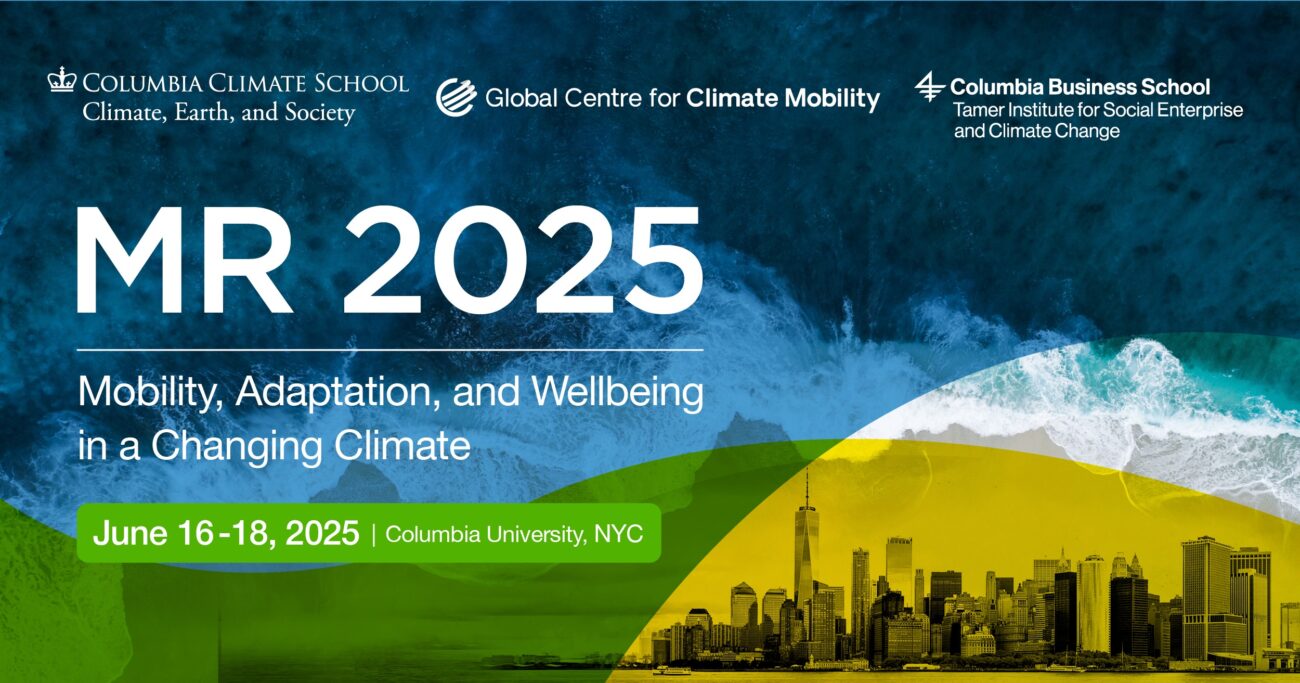What does mobility look like in the face of climate change? How can we build more just and climate-resilient communities? When should areas opt for adaptation in place over managed retreat? These are just some of the questions to expect at this year’s MR2025 (formerly known as Managed Retreat) conference. Hosted by the Columbia Climate School, the event will tackle the multifaceted concerns of mobility, adaptation and wellbeing—and their shifting roles in response to global climate threats.
Now in its fourth iteration, MR2025 will once again bring together hundreds of representatives from the public, private and nonprofit sectors alongside scientists, academics and community members from around the world. It will be held from June 16 to June 18, in partnership with the Global Centre for Climate Mobility and the Tamer Institute for Social Enterprise. The full program can be found here.
A More Inclusive Agenda
The concept of managed retreat sometimes feels limited “to a fairly technocratic discussion around policy, real estate, legal options, zoning and a range of issues that typically are most salient in high-income countries,” said Alex de Sherbinin, a senior research scientist and director of the Center for Integrated Earth System Information within the Columbia Climate School. This limited scope is why “we’ve started opening the door more and more to larger conversations around how climate change might shape future population geography—where people settle and where they might move in the future,” he added. “We wanted to open the conversation more broadly to questions around mobility and resilience.”
Some issues that will likely crop up at MR2025: Should restrictions be placed on where people are allowed to settle? Under which circumstances do people potentially become immobile or trapped in locations where the climate deteriorates? What is the role of planned relocation? “These questions are germane for both high- and low-income countries,” de Sherbinin said.

Additionally, there will be discussions around communities and climate displacement in the global south. “It’s often presumed that people will move to major cities or secondary cities in their countries,” de Sherbinin said. “But if they’re largely agrarian populations, how do they adjust and adapt to living and working in new sectors in urban areas? What happens to informal settlements?”
In places like the U.S. and Europe, he continued, questions will likely center on planning for growth in regions that are suddenly receiving climate migrants. For instance, what are some of the cities in the U.S. that could accommodate additional populations because they’ve lost populations in the recent past? When is it best to build more barriers and seawalls, or invest in more sustainable infrastructure instead of relocation?
Underlying all of this will be questions of equity and access. For example, who benefits most from government response to a disaster? Which communities can or cannot afford to rebuild?
“A lot of the sessions, conversations and workshops we’ll be having address what community involvement looks like in this space, and in many cases, these will be led by members from those communities themselves,” said Sheehan Moore, a postdoctoral fellow at the Columbia Climate School who is helping to organize the conference.
Who Will Be at MR2025?
The three-day event will host academics, activist organizations like the Climigration Network, practitioners, policymakers and community groups. The numbers of international participants may be down substantially from past years because of visa difficulties and current travel risks, de Sherbinin said, but organizers expect a healthy amount of international participation, especially virtually. Former President of Costa Rica, Carlos Alvarado Quesada, who has been an outspoken climate advocate involved with the Global Center for Climate Mobility, will be one of the plenary speakers. Dean of the Climate School Alexis Abramson will give opening remarks, and Lamont-Doherty Earth Observatory research professors Michael Steckler and Marco Tedesco will be discussing, respectively, landscape and elevation change in coastal Bangladesh, and AI and climate justice.
Like many such events, MR 2025 has had to adapt to changes from a shifting presidential administration and funding cuts. While panels and sessions organized by federal organizations, including the Environmental Protection Agency, will no longer be possible, “we’ll focus on what more can be done at state and local levels that doesn’t need to involve federal funding or leadership,” de Sherbinin said.
There are sessions, including “Non-federal funding: Creating and supporting voluntary home-buyouts in your communities,” Moore said, which are going to be “a really valuable space for people to have conversations about what the funding landscape will look like going forward.”
Overall, “this will be the fourth iteration of the conference, and it feels like it’s really knit together groups and individuals who hadn’t previously worked together,” de Sherbinin said. While the academic outputs are easy to pinpoint, including special issues of Science and Frontiers in Climate on the theme of managed retreat that would not have come together without the conference, he added, it’s the new and ongoing connections that represent the most important takeaway from these conferences.
“Having people talking about cases from Bangladesh to Alaska, and making these connections in this space is extremely valuable and otherwise kind of difficult to make happen,” said Moore. “Where an institution like the Climate School can really shine is providing the resources and spaces to facilitate these conversations. As Alex said, it’s become a kind of community where people are coming back every two years and seeing familiar faces, touching base and keeping these conversations going.”
Source link
Olga Rukovets news.climate.columbia.edu

